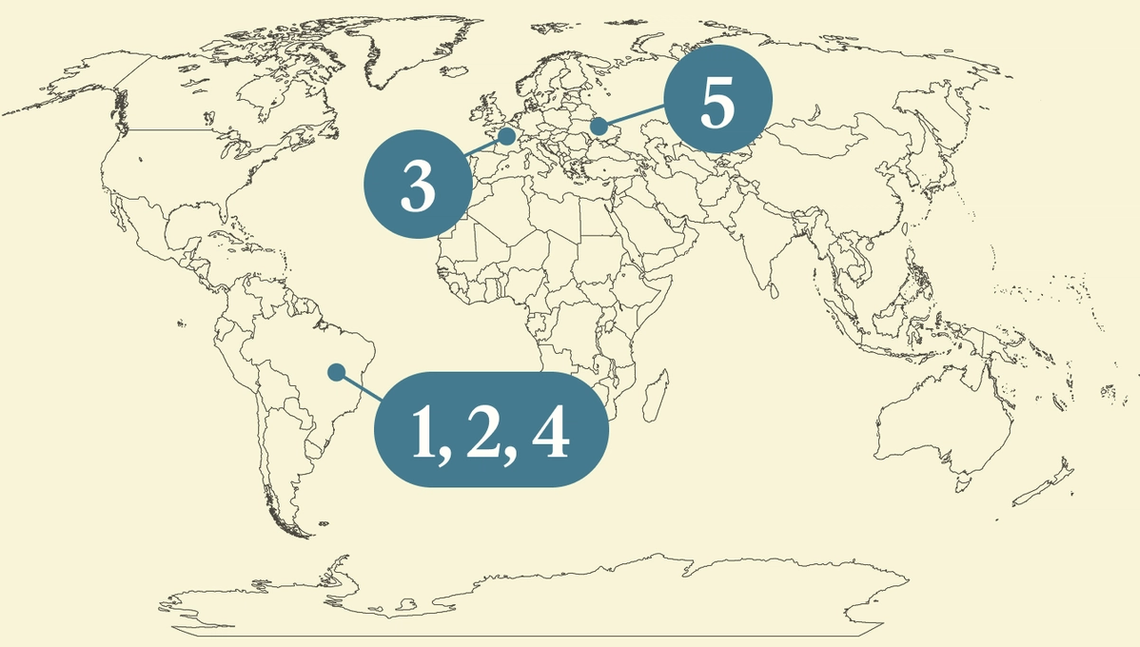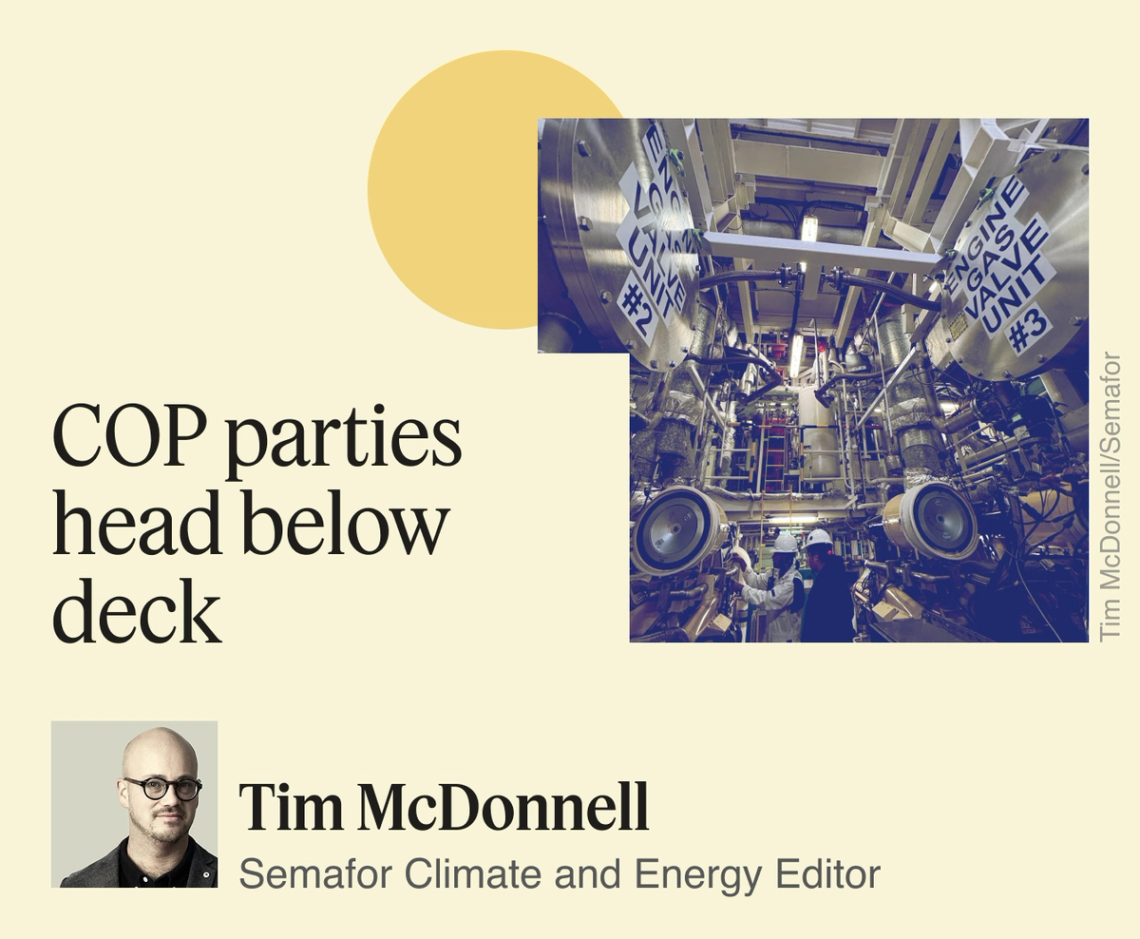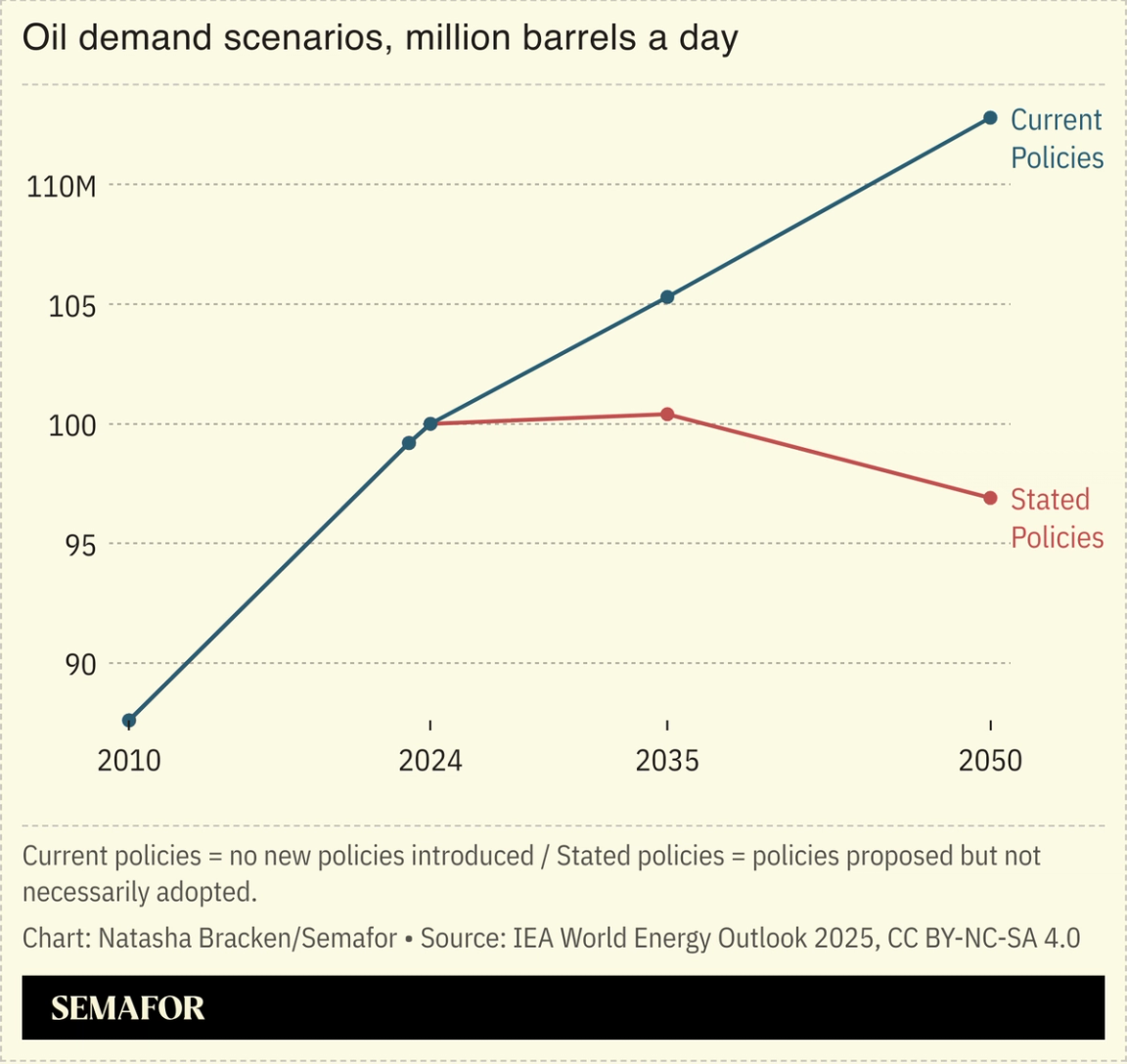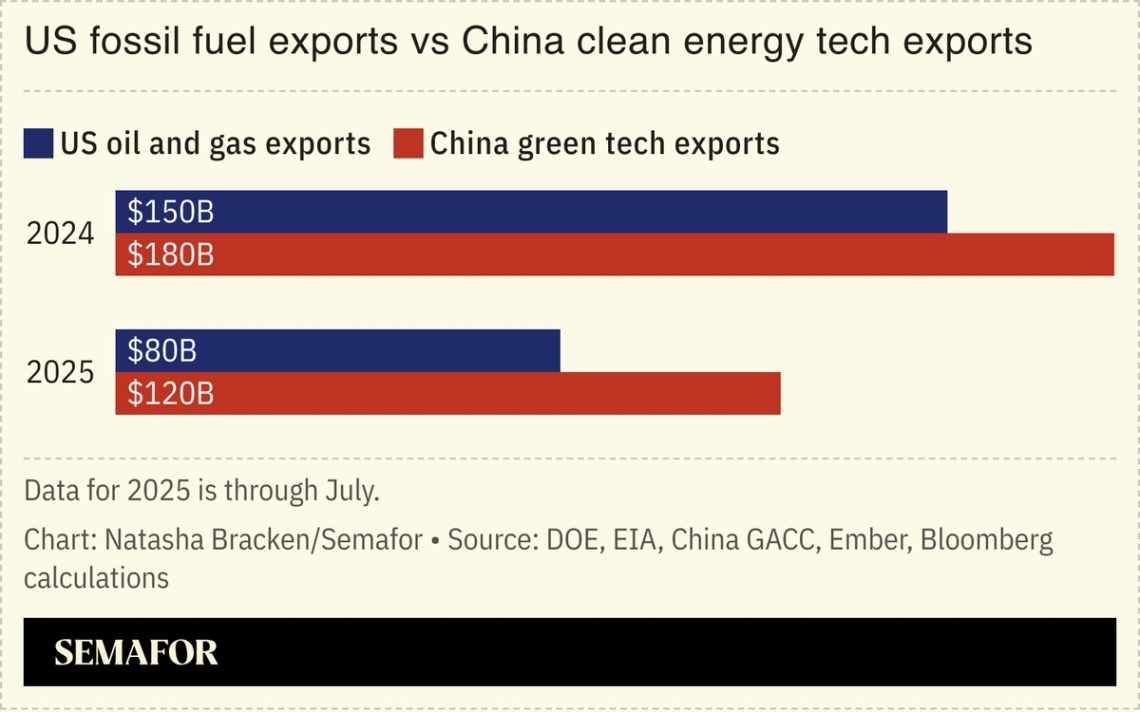| | Brazil is in a delicate diplomatic position.͏ ͏ ͏ ͏ ͏ ͏ |
| |  | Energy |  |
| |
|
 - COP’s next fossil fight
- Newsom steals COP spotlight
- Divergent fossil futures
- GDP boost
- Energy corruption scandal
 How to lead an academic climate department while universities are under federal scrutiny. |
|
 Negotiations may be off to a slow start at COP, but the after-hours party scene is alive and well. On Wednesday night, the caipirinhas were flowing past midnight at a party co-hosted by Google and Octopus Energy and well attended by an eclectic mix of journalists, venture capitalists, and NGO leaders. Google’s chief sustainability officer, Kate Brandt, told me she tried not to take it too personally when numerous news outlets reported this week that top corporate leaders had stayed away from COP. And what good would a conference on a coastline be without a good party on a billionaire’s yacht — in this case, the ammonia-powered Green Pioneer of the Australian iron giant Fortescue and its chairman Andrew Forrest. The ship is a kind of globe-trotting demonstration project, meant to prove that major shipping vessels could one day run on fuel derived from renewable electricity. Real green hydrogen remains in short supply, so for now the ship runs mostly on conventional ammonia of the kind used in fertilizer. (Ammonia is toxic even in small concentrations, so when the ship pulls into port for cocktail parties — as it has done from Singapore to London and many stops in between in recent months — it has to offload the fuel and run on normal diesel instead.) Perhaps the most headline-grabbing “party,” of sorts, was the rush on Tuesday night of Indigenous protesters through the UN security checkpoint at the conference entrance, which produced the biggest stampede of cops and camera-toting TV journalists I’ve seen at a COP since Leonardo DiCaprio popped into COP26 in Glasgow. Even though there’s a strong community of Indigenous rights advocates here in Brazil, they continue to be mostly marginalized in the talks and, from what I saw, kept out of the Green Zone area that is meant to be open to the public. |
|
| |  | Tim McDonnell |
| |
 Wagner Meier/Getty Images Wagner Meier/Getty ImagesThe oldest recurring fight at international climate summits — whether and how to cut oil and gas out of the global economy — is surfacing again at COP30, threatening to divide delegates on an issue that many thought was long resolved, but is in fact proving more contentious than ever. Brazil, the summit host, is pushing countries to create a detailed plan for how to execute a landmark commitment adopted at COP28 in Dubai, for countries to “transition away from fossil fuels in energy systems, in a just, orderly and equitable manner.” President Luiz Inácio Lula da Silva called for such a plan in his opening remarks last week, and on Wednesday he gained several important new supporters, including Colombia, Denmark, France, Germany and the UK. The Colombian delegation is now circulating a draft “declaration on fossil fuels,” seen by Semafor, which asks signatories to “reaffirm our shared determination” to transition away from fossil fuels and to create a roadmap “to articulate and support transition efforts.” |
|
Newsom steals COP spotlight |
 Adriano Machado/Reuters Adriano Machado/ReutersCalifornia Gov. Gavin Newsom, the highest-ranking US official to attend the COP30 summit in Brazil, told delegates here that a Trump administration plan to open the California coast for drilling will only happen “over our dead body, full stop.” Newsom, who is stirring speculation about a 2028 bid for the White House, spent his day in Belém touring a riverside sustainable agriculture lab, signing a partnership with German officials to collaborate on nuclear power and other clean tech, and addressing a crowd of delegates from US city governments and universities about the importance of subnational climate leadership. In addition to condemning the offshore drilling plan, Newsom said it is vital for Democrats to reframe the climate debate as an economic issue, with a focus on jobs and energy affordability. Trump “is doubling down on stupid and trying to vandalize our progress,” he said. Chinese leader Xi Jinping, meanwhile, “is singing [Trump’s] praises, and flooding the zone on the great economic opportunity in the transition to clean energy. We won’t allow that to happen.” |
|
 Global oil and gas consumption will rise into the 2050s under current government policies, a major International Energy Agency report said, putting the world on track for a significant overshoot of the Paris Agreement warming target. In the latest version of its annual World Energy Outlook, the IEA re-introduced an economic scenario built on existing policies, as opposed to plans or commitments, which is far more bullish for fossil fuels than the agency’s other recent reports have been. A very different future remains possible. In the scenario in which governments’ stated intentions about future policies are implemented, oil demand will flatten out by 2030, although gas demand will continue to rise. Both scenarios are far off track for what is needed to fully decarbonize the global economy by 2050, but one thing is clear in any case, IEA Executive Director Fatih Birol told journalists: A rapidly growing share of energy will come from electricity, rather than direct combustion of fuels: “We can comfortably say the age of electricity has arrived.” |
|
 The amount by which low-and middle-income countries could see their GDP grow within 25 years if they transition to renewables quickly enough to double energy-sector productivity, a new report found. The Oxford University study found that renewable energy productivity gains are especially consequential in developing countries: Already, between 2017 and 2022, renewable investments in the 100 largest developing countries (excluding China) contributed a combined $1.2 trillion to GDP growth — equivalent to 2-5% of GDP for most of these nations. This for a few reasons: First, renewables generate more electricity per dollar invested than fossil fuels, and, perhaps more importantly, they’re cheaper to operate. Decentralized renewables like solar mini-grids or rooftop panels are also better at reaching more rural areas where grid connections can be pricey and faulty. And green energy spending multiplies through local supply chains and wages far more effectively than fossil fuel investments. — Natasha Bracken |
|
 The global financial system is entering a new era. The innovations that once reshaped markets, from index funds to ETFs, have become commoditized. In their place, a new wave of financial engineering is emerging. Semafor’s Liz Hoffman will convene leading figures in global finance at Semafor Business: The Ledger. On stage, they’ll explore which innovations will shape the future of the financial system — and which are poised to collapse under their own weight. On-the-record conversations with Michael Patterson, Senior Managing Director in the Private Financing Solutions Executive Office of BlackRock and Gregg Lemkau, Co-CEO of BDT & MSD Partners will dive into the new risks and new power brokers behind untested innovations. Dec 2 | New York City | Request Invitation |
|
Energy corruption scandal |
 Vyacheslav Madiyevskyy/Reuters Vyacheslav Madiyevskyy/ReutersUkraine’s justice and energy ministers resigned over a wide-ranging anti-corruption investigation targeting the state-owned nuclear power company. President Volodymyr Zelenskyy demanded the resignations after investigators said they uncovered evidence of a $100 million kickback and money laundering scheme and pressed charges against seven other people. The scandal is unfolding amidst a fresh wave of Russian attacks on energy infrastructure in Ukraine, including against nuclear power substations, that have left Kyiv and other cities facing blackouts of up to 16 hours per day. The investigation makes clear that despite attempts by Zelenskyy’s government to prove to its US and EU allies that it is capable of rooting out endemic graft, corruption remains pervasive in the energy sector. But there is a bright side, Victoria Gryb, a lawmaker on the energy committee of Ukraine’s parliament, told Semafor: “I think it’s a very good sign that anti-corruption reform is moving forward. If we approach this case properly, it will send positive signals to foreign governments and investors.” |
|
 New Energy - In the US, meanwhile, another giant offshore wind project in New Jersey was cancelled, Heatmap reported.
Fossil FuelsFinancePolitics & Policy- Conservatives and far-right groups in the European Parliament joined forces to pass the EU’s first omnibus simplification package, which exempts more companies from green reporting rules.
- The bill that would end the US government shutdown includes cuts to the Department of Agriculture’s climate hubs, which “produce regional research and data on extreme weather, natural disasters and droughts to help farmers make informed decisions,” E&E News wrote.
COP30- 193 countries have registered a delegation for this year’s COP, and the largest, after that of host country Brazil, comes from China.
- Beijing declined to invest in the Tropical Forests Forever Fund launched at COP, sources told Bloomberg.
|
|
Alexis Abramson, dean of the Columbia University Climate School |
|
|